
Establishing a circular economy would have a transformative impact on the oil and gas industry – but the only way of doing so to any extent would be through ramping up plastic recycling, according to a new report.
GlobalData’s new Circular Economy in Oil and Gas report analyses the growth of plastic waste and the crucial role of oil and gas industry in enabling the circular plastic economy.

Discover B2B Marketing That Performs
Combine business intelligence and editorial excellence to reach engaged professionals across 36 leading media platforms.
It states that “incorporating product circularity in the context of the oil and gas industry is extremely difficult” but cites plastics as “the most relevant to the circular economy” among the industry’s conventional products.
The circular economy model refers to a zero-waste system, in which materials are repeatedly used and reused to reduce pollution. There has been increasing pressure from consumers and governments for companies to reduce waste, but plastic production has boomed, growing at a CAGR of 4.1% between 2000 and 2019.
It’s feasible that the tide could turn, however.
The report argues that “eventually, it will reach a point where companies that do not convert their linear operations to a circular model risk failure due to government-imposed fines and consumer boycotts.”

US Tariffs are shifting - will you react or anticipate?
Don’t let policy changes catch you off guard. Stay proactive with real-time data and expert analysis.
By GlobalDataAlternatively, shifting to a circular economy ahead of the curve would present opportunities for oil and gas companies looking to establish themselves as ESG leaders, and creating, managing and reusing circular polymers is proving to be of interest.
TotalEnergies, for example, has stated that it will produce one million tons of circular polymers by 2030. The production will increase their recycling options, and enable the company to meet its ESG obligations.
The challenge lies in the nature of plastic. Made up of polymer chains, the chain length reduces each time the material is recycled, meaning the quality of the plastic drops. As a result, plastic can usually only be recycled two or three times, or new plastic must be added to improve quality.
However, there has been progress in the area. The report notes the example of Saudi Aramco and its partners, which successfully demonstrated a chemical recycling process in July 2023 at its SATORP refinery, jointly owned by Aramco and TotalEnergies. The circular polymers derived from the plastic waste have been given ISCC+ certification.
Bioplastic development is also showing promise, and attracting interest from oil and gas companies. Made from biomass (such as agricultural waste) rather than oil or gas derivatives, bioplastics are easier to recycle. Currently, over half of bioplastic is biodegradable, but accounts for less than 1% of the global plastic production.
This could change, however, with oil companies Petronas and PTT investing to develop bioplastic production competencies.
But, there are of course obstacles to development. The report states that “petrochemical companies are developing renewable feedstock using agricultural and organic waste to produce bioplastics … The probable downside of using this feedstock is the availability of organic waste in sufficient volumes to meet the market demand. Shortage of feedstock may lead to unfavourable practices, such as deforestation, besides cost escalation in plastic manufacturing.”
The report notes the particular oil and gas leaders in plastic management, identifying BP, Repsol, Shell, TotalEnergies, OMV AG, and ExxonMobil.
However, the report also notes that companies “will need to rely on financial incentives from government establishments to productively pursue the circular economy objectives. This is because of the high inherent cost involved in incorporating a circular economy.
“Some companies have taken small steps towards this. Industry leaders such as ExxonMobil, Shell, and TotalEnergies have set themselves targets to increase plastic recycling at their facilities.”





